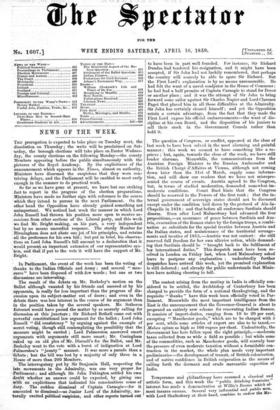The question of Congress, or conflict, appeared at the close
of last week to have been solved in the most alarming and painful manner ; this week we seemed to have something like a re- prieve; but, again, towards the close of the week, we have still louder alarums. Meanwhile, the communications from the Austrian Foreign Minister to the Russian Ambassador and the British Charge d'Affaires at Vienna, although not coming down later than the 31st of March, supply some informa- tion, and will show our readers that we have not misrepre- sented the course of events. Austria agreed to the Congress, but, in terms of studied moderation, demanded somewhat im- moderate conditions. Count Buol hints that the Congress should be reserved to the Powers of the first rank ; that the in- ternal government of sovereign states should not be discussed except under the condition laid down by the protocol of Aix-la- Chapelle in 1818; and that before all conference Sardinia should disarm. Even after Lord Malmesbury had advanced the four propositions,—an assurance of peace between Sardinia and Aus- tria, evacuation of the Roman states by the foreign troops, a combi- nation as substitute for the special treaties between Austria and the Italian states, and maintenance of the territorial arrange- ments and treaties of 1815,—Austria was not content : she still reserved full freedom for her own ulterior action, while demand- ing that Sardinia should be "brought back to the fulfilment of her international duties." This despatch must have been re- ceived in London on Friday last, when Lord Malmesbury asked leave to postpone any explanation ; undoubtedly further deepatohes have arrived this week, yet the promised explanation is still deferred ; and already the public understands that Minis- ters have nothing cheering to tell.


























